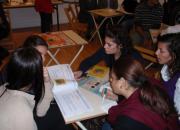

Subscríbete al SCP News
The CP/RAC rose awareness on POPs among university students in Malta

The UNEP / MAP Regional Activity Center for Cleaner Production (CP/RAC) rose awareness on Persistent Organic Pollutants (POPs) among students of the University of Malta organizing a workshop titled "POPs in our Life". The workshop took place on 6th December 2011 with the aim to give attendants basic information about some toxic chemicals that are present in our day life.
The participants were 30 people among students, university professors and members of NGOs. During the workshop it was showed to the participants where POPs are, how they can affect our health and environment and with which solutions we count in order to minimize their presence in our environment.
The first part of the workshop was theoretical, with an introduction to POPs and information related to the role of the Stockholm Convention and its Regional Centers; and the second part of the training was interactive, with the viewing of short videos about POPs in textile, electronics and food. The closing of the workshop was preceded by the projection and the debate of the film Silent Snow, a documentary by Jan van den Berg focused on how chemical residues from all over the world are being accumulated in the Arctic invisibly, poisoning both humans and animals.
The speakers of the workshop were Roland Weber, independent international consultant on the implementation of the Stockholm Convention on reduction of POPs, visiting Professor at Tsinghua University in Beijing, board member of the NGO "Solidarity.Ecology and Lifestyle" and ambassador of the International HCH and Pesticide Association; Virginia Vidal, project manager on POPs in the CP/RAC; and Meritxell Remolins, environmental communication and museography expert in the Communication Department of LAVOLA.
POPs are chemicals that are persistent, they remain intact for exceptionally long periods of time; that are volatile, they become widely distributed throughout the environment reaching areas where they were neither produced nor used; that are bioaccumulative, they accumulate in the fatty tissue of living organisms; and that are highly toxic. If humans are exposed to POPs the effects on health can be serious and for this reason the international community has set up important instruments to regulate and control their use, as the Stockholm Convention on Persistent Organic Pollutants.














